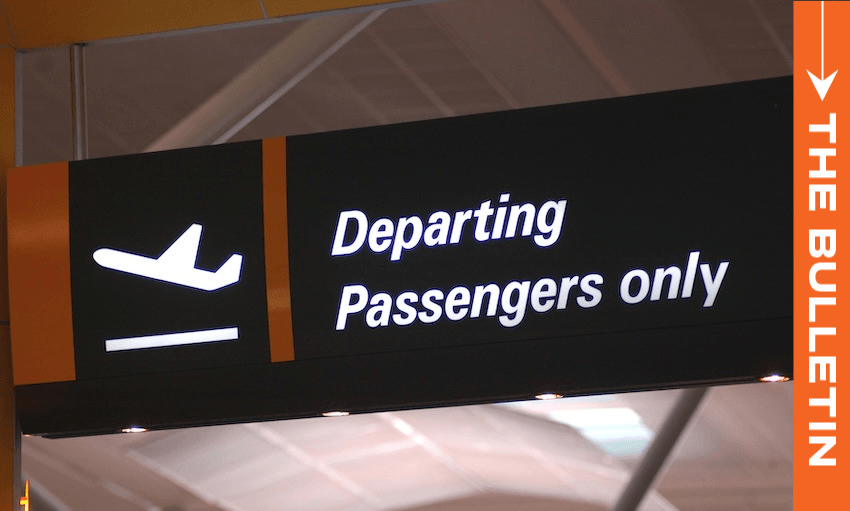The Aussie exodus is fuelling fears of a hollowing-out at home – but not everyone agrees that alarm is warranted, writes Catherine McGregor in today’s extract from The Bulletin.
To receive The Bulletin in full each weekday, sign up here.
Record departures driven by Australia’s stronger labour market
New Zealand is losing people at a pace not seen in years. In the 12 months to March 2025, a provisional record of 70,000 New Zealand citizens left the country, according to new figures from Stats NZ, with around two-thirds heading to Australia. The net migration gain was just 26,400 – barely a quarter of last year’s figure – reflecting not only fewer arrivals but a steady stream of departures.
Many are being drawn across the Tasman by better job prospects and significantly higher pay. Australians, on average, earn 33% more than New Zealanders, and in sectors like healthcare, trades and mining, the gap is even more stark. Some nurses, for instance, are earning nearly double what they were paid in New Zealand, and engineers just out of university like Zach Coventry, who was interviewed in The Post last October (paywalled), are stepping straight into six-figure salaries.
The Guardian’s migration story goes viral
Published last week, Michelle Duff’s in-depth feature for The Guardian on the exodus to Australia has clearly hit a nerve, becoming a viral talking point both here and abroad. It painted a vivid picture of families, young workers and retirees leaving behind lives they thought they’d never abandon, motivated not by dreams of adventure but the hard maths of household budgeting. “That Australian income just flipped the switch for us,” said one woman now living in Western Australia.
The Economist (paywalled) covered the topic in March, noting that adjusted for purchasing power, Australia’s per capita GDP is about a third higher than New Zealand’s. While that’s long been true, what’s changed is the breadth of the departures: no longer just 20-somethings chasing an OE, but now their parents, children and grandparents too. “We talk about where the ‘centre of gravity’ for a family is, and if you’ve got parents, grandchildren or adult children living elsewhere, you’re relocating your centre of gravity,” Massey sociologist Paul Spoonley told The Guardian.
A brain drain, or business as usual?
While the headlines scream brain drain, economists and demographers are more cautious. Speaking to The Post’s Luke Malpass (paywalled), BNZ economist Stephen Toplis calls the notion of a mass loss of top talent “a bit of a fallacy”, arguing that many high-skilled workers are still arriving from overseas. NZIER’s Peter Wilson is less sanguine. He says the impact on NZ appears net-negative, pointing to evidence that New Zealanders in Australia are on average higher-earners than their local peers, suggesting that it’s not those who couldn’t get a job who are leaving, but those “chasing higher wages, better conditions, and a stronger economy”, Malpass writes.
Meanwhile, a recent Ministry of Education report found that 6% of the highest-performing NCEA students from 2023 went overseas, a record high, though it’s unclear how many are enrolled in foreign universities or will return. Chris Whelan of Universities New Zealand suggests the spike may be temporary, driven by post-pandemic wanderlust, but warns that if it becomes permanent, New Zealand’s tertiary sector could suffer.
Perth, Brisbane and the promise of a better life
For many New Zealanders making the leap, the choice of destination is clear. Queensland, with its warm weather and job-rich economy, is the top pick – one third of all New Zealanders who moved to Australia in early 2024 settled there. Victoria was next, followed by New South Wales and Western Australia. Perth, in particular, is booming for those in mining and trades, while Brisbane’s sunny lifestyle and affordable transport are big draws.
However, the affordability edge may not be what it seems. While salaries are higher in Australia, so too are many living costs – especially housing. Writes The Post: “Across the board, houses are now comparatively more affordable in city centres like Auckland, Wellington and Christchurch, than their direct counterparts in Sydney, Melbourne and Brisbane (though if you were moving from Auckland to Brisbane, you would be better off).” Yet the economic benefits are undeniable. As one migrant told The Guardian, “We’re putting $1,000 away a fortnight and we enjoy our life, we’re not scraping by or wondering what the grocery bill is.”

